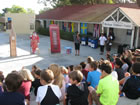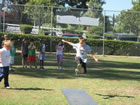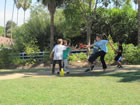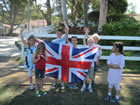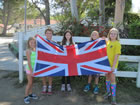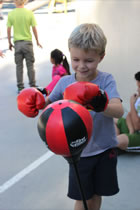Metrics and PE Working Together
written by Kim
Nygaard, Peninsula Heritage School, Rolling Hills Estates,
California
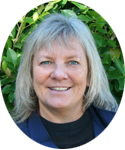 Click
the thumbnail photos at the right and bottom of the page in
order to view larger photos. Click
the thumbnail photos at the right and bottom of the page in
order to view larger photos.
In a world of constant change, and
especially the way PE and physical fitness has changed, one
thing remains the same and that is the metric system around
the world.
PE
Metrics is the standards-based, cognitive and motor skill
assessment package from NASPE that uses valid and reliable
evaluation tools to measure student progress toward achieving
all six National Standards for Physical Education. The PE
Metrics package includes books, professional development and
a Web-based application; everything you need for comprehensive,
high-quality physical education assessment.
Each year Peninsula Heritage celebrates
Metrics Week (the second week in October) with a theme. This
year's theme "London
2012 Olympic Games" was an excellent way to teach
and have the children experience metric race events. Using
the Olympic Games slogan "Inspire a Generation"
was a great way for me to introduce the Olympic events I was
going to have the children participate in.
The math department and PE department
collected ideas of how to bring another successful event to
the children. For one week we decorated the school with flags
from around the world, British and Olympic decorations, set
up "measuring" work stations using Olympic venues
such as: Earls Court, Olympic Park, etc.., and used punch
cards/Olympic tickets for these stations, a couple of Olympians as speakers, and had a Victory podium set up for medal ceremonies,
Olympic torch run, pin exchange, and a sample of foods like
scones, fish & chips, and tea. The morning included:
- Capacity: Here we had the children measure the capacity
of different containers in L and ML.
- Length: We measure height in cm
at the Big Ben Wall.
- Used a cricket bat to hit the
ball a particular distance (30m)
- 50m race walk/discuss throw
- Toss the willies (English rain
boots)
- Used a trundle wheel for measuring
distance and calculating feet, yards to meters.
- Mass: Measured the children's mass
in kg
- Covent Garden Market: Weigh
British food & other items (tea bags, medals, jewels)
Using triple beam balance scales.
- Temperature: Measure the Celsius
temperature on thermometers.
- Physical Activities: My PE classes
in the afternoon were centered around Olympic events. We
Practiced for 1 week and competed for 1-2 weeks.
PE Olympic events: I divided the school and grades up into
3 teams: USA, Great Britain, & Sweden I decided to bring back
some of the Olympic games/events from the 1900's including
Tug-Of-War and Polo. These are the events used in competitions:
- Track Events: Long Jump, Shot put, Sprint
Relay, and Distance relay, Race Walking (measured in meters)
- Polo: I made
Horses on Sticks and the children rode the horses and used
mini hockey sticks to score goals.
- Tug- Of-War:
Countries competed against each other. 2 out of three tries
- Boxing: Had a
stationary boxing bag with boxing gloves. Counted the repetitions
using a right-left jab motion.
- Baseball: We
played whiffle ball and each country played each other.
In case of a tie we held a Homerun Derby with 2 batters
from each country to declare the winner.
- Hockey Shoot:
Machine shoots out the balls. Children have to time it right
and try to make goals. 4 balls are used for this.
- Triathlon: I
used scooters for the swimming (lay on stomachs and use
arms in a swimming motion to move across the cement). I
used tricycles for the biking portion, and ran 1 lap (125
meters) for the last running leg.
Handouts: Discontinued
Summer Olympic sports & Meters
to Medals Metric Week Olympics
It is a different world, but PE is still (in my opinion)
the most important gift we can give any child. Self-esteem
building, self-confidence, conflict resolutions, cooperation,
and competition are what all children learn and continue to
grow as they mature. Hopefully from the lessons physical education
instructors emphasize, children will have valuable tools to
help them mature into excellent community members through
their character and hard work.
As Physical educators our job, for educating not just our
students but our parents and communities, has become quite
difficult. While we try to get the support and motivation
to teach not only skills and sports skills but the realization
that life-long fitness is essential to every child's life,
we sometimes run into roadblocks. As long as you believe what
you are doing is the best you can do for the children you
teach, you can enjoy your lessons and setting goals for yourself
and classes can make the biggest difference in the world of
a child.
My professional goals I set are to get children involved.
Physical Education doesn’t have to be about the popular
sports that are offered but about a journey that each child
takes to get them on or keep them on the path to lifelong
fitness. I have had success with the adventures I bring to
my classes which include:
- Metric Week Challenges & Competitions
- Survivor Tribe challenges, cooperation
and competition
- Tour de France tricycle 21 stage
adventure
- The Amazing Race/Passport to Play
Cultural adventure
- Iditarod Dog Sled Race learning
about the “Great Race” through Alaska
- Summer/Winter Olympics Cultural
and competitions
- Dances from around the World cultural,
rhythms, cooperation
Other fun and exciting programs I look for and our school
was excited to do:
- WSSA Cup Stacking Guinness World Record each year
- JAM World Record 2012 Team ( jamworldrecord.org
)
- National Geographic Kids breaking
world record for most people doing jumping jacks in a 24
hour period
This year's walking club theme is "Water is Life…Pass
it on!" Each year I set up a walking club at my school
which supports fitness through walking/running before or after
school and during recess time. This year we are combining
our walking club with a fundraiser I found on Blue
Planet Network. The children will be busy collecting pledges
per mile or flat donations as they walk with their friends,
teachers, and staff trying to raise money for our third world
countries, and bringing safe drinking water to families. Unsafe
drinking water is the world's leading cause of sickness and
disease.
Knowing that our school can make a difference, I decided
to team up with Team Blue from the planet network and we are
excited. Our walking club will go from Nov. 1, 2012 to Dec.
7, 2012. Info on this program is found at: www.blueplanetnetwork.org.
I also included a letter to my parents explaining this wonderful
opportunity for the community to get involved in both fitness
and fundraising.
Handout: 2012
Peninsula Heritage Walking For Water Club
The world is changing and so must we. How is your PE program
affecting the way you teach, and the motivation of your students?
Are we teaching "In the moment" games or are we
teaching lifelong fitness and movement lessons those children
can take with them? Each year I find ways to capture enthusiasm
in my classes. At the end of the year I can reflect back to
the goals I set and accomplished, and what I need to "change"
for the following year.
As you continue to educate your students, I wish you success
and enthusiasm along the way.
Please feel free to contact me anytime.
Kim Nygaard (kim_nygaard@msn.com
)
(back
to pelinks4u homepage) |




 Click
the thumbnail photos at the right and bottom of the page in
order to view larger photos.
Click
the thumbnail photos at the right and bottom of the page in
order to view larger photos. 



